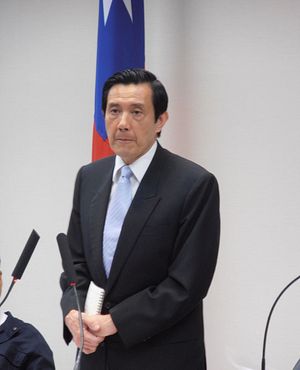Although relatively muted in recent years, Taiwan is seen as the greatest potential flashpoint in U.S.-China relations. Indeed, U.S. defense analysts perceive China’s expanding Anti-Access/Area Denial (A2/AD) capabilities primarily through the lens of preventing the U.S. from intervening should Beijing invade Taiwan. Consequently, the main concepts the U.S. military has developed for countering A2/AD — namely, Air-Sea Battle and a blockade approach — appear to be based on the assumption that a shooting war with China would break out over Taiwan.
In many ways, the concern over Taiwan is well-placed. China covets the island far more than any other piece of real estate, including the Diaoyu/Senkaku Islands. For CCP leaders and many ordinary Chinese, Taiwan is one of the vast remaining vestiges of the country’s century of humiliation. Acquiring Taiwan would also significantly enhance the PLA’s ability to project power outwardly. Despite improvements in cross-Strait relations in recent years, China has refused to rule out the possibility of invasion.
Besides having the motivation to acquire Taiwan, China seemingly is rapidly acquiring the capability to take the island by force. In recent years, the cross-Strait military balance has rapidly shifted in Beijing’s favor, and this trend is almost certain to continue so long as China’s economy continues to grow. Today, China has at least 1,600 ballistic missiles pointed at Taiwan, and Taiwan’s own Ministry of Defense admits that China will have sufficient military capabilities to mount a full cross-Strait attack by 2020.
This has led some U.S. analysts, particularly academics of the Realist persuasion, to argue that the U.S. should gradually cede Taiwan to the People’s Republic of China. For example, Charles Glaser argued in a controversial Foreign Affairs article in 2011 that, given the risks of nuclear war between China and the United States, “the United States should consider backing away from its commitment to Taiwan. This would remove the most obvious and contentious flash point between the United States and China and smooth the way for better relations between them in the decades to come.”
Similarly, in a recent talk in Taiwan, John Mearsheimer argued that short of acquiring an independent nuclear deterrent, Taiwan’s best option is to pursue the “Hong Kong strategy” toward Beijing. Under the Hong Kong strategy, “Taiwan accepts the fact it is doomed to lose its independence and become part of China. It then works hard to make sure that the transition is peaceful and that it gains as much autonomy as possible from Beijing.”
Although the trend lines are undoubtedly working in China’s favor, it is ultimately extremely unlikely that China will try to seize Taiwan by force. Furthermore, should it try to do this, it is unlikely to succeed.
Even assuming China’s military capabilities are great enough to prevent the U.S. from intervening, there are two forces that would likely be sufficient to deter China from invading Taiwan. The first and least important is the dramatic impact this would have on how countries in the region and around the world would view such a move. Globally, China seizing Taiwan would result in it being permanently viewed as a malicious nation. Regionally, China’s invasion of Taiwan would diminish any lingering debate over how Beijing will use its growing power. Every regional power would see its own fate in Taiwan. Although Beijing would try to reassure countries by claiming that Taiwan was part of China already, and thus the operation was a domestic stability one, this narrative would be convincing to none of China’s neighbors. Consequently, Beijing would face an environment in which each state was dedicated to cooperating with others to balance against Chinese power.
But the more important deterrent for China would be the uncertainty of success. To be sure, China’s military capabilities are growing to the point where it will soon be assured of its ability to quickly defeat Taiwan’s military forces. A little longer down the road it will also likely be confident that it can prevent the U.S. from intervening in the conflict.
However, as recent U.S. military conflicts have adequately demonstrated, being able to defeat another nation’s armed forces and being able to pacify the country are two different things altogether. It is in this latter aim that China’s strategy is likely to falter. Taiwanese are adamantly opposed to being incorporated into a non-Democratic China. These feelings would only harden in the aftermath of the invasion.
Thus, even if it quickly defeated Taiwan’s formal military forces, the PLA would continue to have to contend with the remnants of resistance for years to come. Such a scenario would be deeply unsettling for leaders in Beijing as this defiance would likely inspire similar resistance among various groups on the mainland, starting first and foremost with ethnic minorities in the western China. Should the PLA resort to harsh oppression to squash resistance in Taiwan, this would deeply unsettle even Han Chinese on the mainland. In fact, the clear parallels with how Imperial Japan sought to pacify Taiwan and China would be lost on no one in China and elsewhere.
The entire situation would be a nightmare for Chinese leaders. Consequently, they are nearly certain to avoid provoking it by invading Taiwan. The only real scenario in which they would invade Taiwan is if the island nation formally declared independence. But if Taiwanese leaders have avoided doing so to date, they are unlikely to think the idea is very wise as China goes stronger.
Thus, the status-quo in the Taiwanese strait is unlikely to be changed by military force. Instead, Beijing is likely to continue drawing Taiwan closer economically, and seeking to disrupt the U.S.-Taiwanese bilateral relationship. The hope would be that leaders in Taipei will ultimately conclude that they cannot resist being absorbed into China, something China itself can facilitate this by offering favorable terms.

































